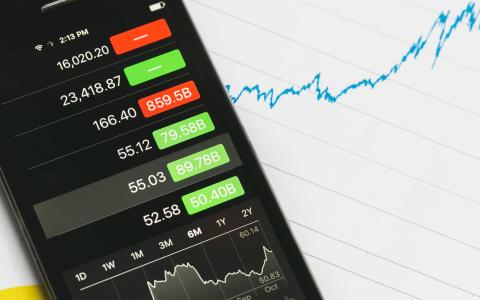
(Yahoo!Finance) - Investors searching for safe places to store some cash amid high inflation and volatile markets have options.
In continuation of Yahoo Finance's series 'What to do in a bear market,' we asked the experts for some ideas about where to park money safely.
What is the safest vehicle for storing money during the bear market?
"The key to 'storing' money in a bear market is to find a balance between the best return and most liquidity, because if you’re in it for the long term you want to be an investor, not a ‘storer,’” Jennifer Bellis, private wealth adviser at U.S. Bank Wealth Management, told Yahoo Finance.
In this bear market and a result of rising interest rates, “short-term treasuries are the clear winner when it comes to parking money,” said Bellis.
Treasuries are bonds issued by the U.S. Department of Treasury backed by the government.
“For that reason, they’re usually considered to be the safest investment vehicles, but that doesn’t always mean the best or the smartest,” added Bellis.
“As of today, you can get over a 4% yield on a 6-month Treasury, whereas a year ago, the yield was .06%. Four percent might not sound huge, but the fact that it’s so short term makes the risk-reward an extremely attractive temporary solution,” she added.
What about I bonds?
The Treasury Department’s inflation-protected I bonds rate is set semi-annually. For example, between now and the end of October, investors earn a composite interest rate of 9.62% for the first six months. The I bonds must be held at least a year. Those who sell before five years forfeit a quarter's worth of interest.
“Purchase constraints are the major caveat with I bonds,” Christine Benz, Morningstar's director of personal finance, told Yahoo Money.
There's also a limit to how much investors are allowed to buy.
“Since each taxpayer can only purchase up to $10,000, plus an additional $5,000 through tax refunds, for larger investors, those purchase limits curb the utility of I bonds as a hedge against inflation,” added Benz.
Are there any risks to bonds?
“All bonds have risk. For example, if you buy a $1,000, 5-year Treasury that pays a 5% coupon, you will receive $50 every six months and at the end of 5 years, you’ll receive your $1,000 back. The problem is, with inflation, that fixed $50 payment becomes less valuable every year, and at the end of 5 years, the $1,000 is also worth less. Also, while you’re holding your bond, the values can fluctuate,” said Bellis of U.S. Bank Wealth Management.
She also highlighted that corporate and municipal bonds generally pay much higher rates than Treasuries because they carry a little more risk.
"Municipal bonds generally pay a smaller coupon than corporates, but they can be tax-free, so if you’re in a higher tax bracket, they often produce a better after-tax return," she added.
What about Certificate of Deposits, or CDs?
“CDs typically pay more than savings or money market accounts because they’re issued for various terms, usually 6 months to 5 years, and generally speaking, the longer the lock-up the more it pays, although this isn’t always the case," said Bellis.
"The interest on a CD can either be paid out at different intervals, usually every 6 months, or it can accrue, so at the end of the term you either get your original deposit back or your original deposit plus the accrued interest,” she added.
How important is the ability to convert investments into cash quickly?
“During a downturn, it’s not just safety that is important, but liquidity. Cash allows one to be flexible in the event of unexpected job loss or to invest back into the stock market when it looks cheaper. CDs and other locked-in vehicles can offer higher yields, but liquidity is underrated in difficult times,” Ross Mayfield, investment strategy analyst at Baird, told Yahoo Finance.
“High quality, longer-term bonds are also attractive during downturns, especially at current yields. While they may fluctuate on a price basis as the Fed raises rates (as we’ve seen this year), you can hold an individual bond to maturity and reap both interest and principal,” he added.
By Ines Ferré · Markets Reporter



